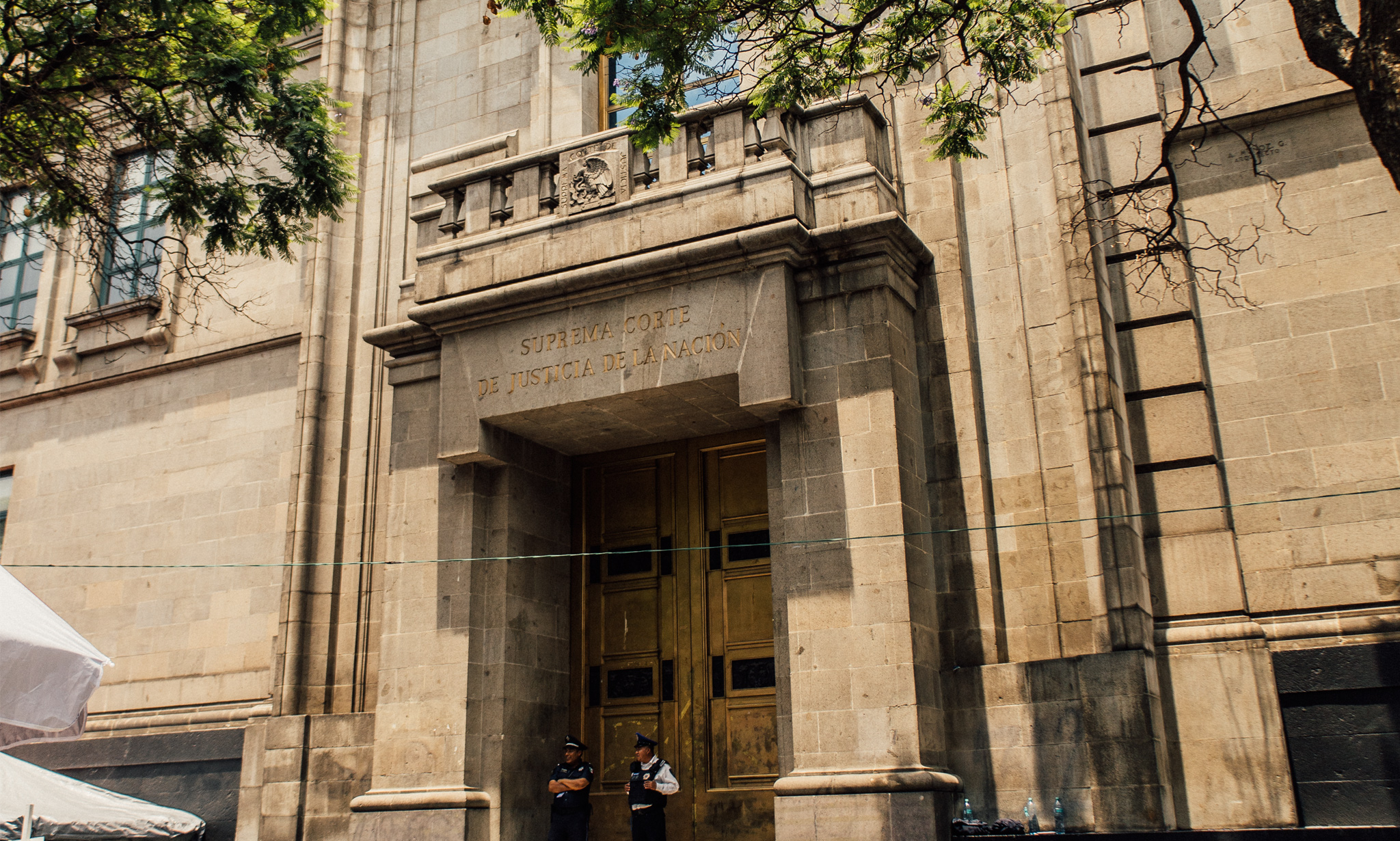Piña Exits, Leaving Judgement of Mexico’s Last Neoliberal Court “to the scrutiny of history.”
This article by Sugeyry Romina Gándara appeared in the August 19, 2025 edition of Sin Embargo.
Mexico City. Norma Lucía Piña Hernández , the last President of the Supreme Court of Justice of the Nation (SCJN) who served during the neoliberal period, said today in her final session that “the work of each one of us is our best voice, and what each of us does in our daily work for justice is our legacy. Consistency, ethics, work, perseverance, excellence, honesty, and dignity are and will be our best letter of introduction under the scrutiny of history.”
On December 5, 1994, Mexcain President Ernesto Zedillo (PRI) presented his Judicial Reform to Congress, removing all the justices. From there, the Supreme Court as we know it began, until the Judicial Reform promoted by Andrés Manuel López Obrador (AMLO) and implemented by the current President of Mexico, Claudia Sheinbaum Pardo.
The SCJN held its final plenary session at noon this Tuesday. At the beginning of the meeting, Chief Justice Norma Piña clarified that the extraordinary session was convened solely to resolve electoral matters, in order to avoid speculation. Among the topics discussed was the validation of the election of two justices to the Superior Chamber of the Electoral Tribunal of the Federal Judicial Branch (TEPJF).
This August 19th was a historic day for the Court, as it was the last joint session of the members of the plenary session: Norma Lucía Piña Hernández, Margarita Ríos-Farjat, Yasmín Esquivel Mossa, Loretta Ortiz Ahlf, Lenia Batres Guadarrama, Javier Laynez Potisek, Alfredo Gutiérrez Ortiz Mena, Juan Luis González Alcántara Carrancá, Alberto Pérez Dayán and Jorge Mario Pardo Rebolledo, several of whom were appointed during the six-year term of President Enrique Peña Nieto (PRI).
During the session, the Chief Justice explained that Article 96 of the Constitution establishes that the National Electoral Institute (INE) must declare the validity of the election and forward the results to the Supreme Court, which exclusively resolves challenges related to the positions of the Superior Chamber of the TEPJF. She noted that, even yesterday, four appeals of nonconformity were filed and addressed in the session, and that in the event that more were received—as in fact occurred with another four—it was decided to convene this extraordinary session.
Meanwhile, outside the courthouse, a small group of members of Active and Peaceful Civil Resistance (RECAP), led by Rolando Solís and Emilio Pineda, protested against Justices Felipe de la Mata and Felipe Fuentes Barrera, whom they accused of being “traitors to democracy.” Carrying a banner demanding the annulment of what they called “the most fraudulent election in the country’s history,” they asked the SCJN not to become “another satellite of the ruling party.” The protesters expressed their desire to avoid “a Wellbeing Court* full of fools and ignoramuses, lacking the capacity that exists in this Court today.
It should be noted that in this session, the first bill discussed concerned the Constitution of Yucatán, stemming from a challenge filed by the Legal Counsel of the Presidency and the National Human Rights Commission (CNDH). The claim argued that Yucatecan legislation contravenes the federal Constitution by allowing the reelection of the president of the local court, which could extend his term until 2037, in contradiction with the federal Judicial Reform approved in September 2024.
However, the Court’s justices dismissed the four appeals against the results of the election of the magistrates of the Superior Chamber of the TEPJF. Jorge Mario Pardo stated that the challenges were dismissed because the legal standing established by the relevant law to challenge the election had not been established.
Meanwhile, Norma Piña maintained that these resources were the last to arrive, and that by rejecting them and considering that no more would arrive, they decided to close their sessions and gave a farewell message.
Piña Says Goodbye
In the final plenary session of the current Supreme Court, Chief Justice Norma Piña offered a farewell address, in which she recognized the justices who served in this administration for more than three decades.
“With the closing of this session, a fundamental cycle of Mexican public life that began just over 30 years ago concludes. This history has been written with intense debates, fruitful disagreements, and consensus that, far from quelling diversity, have strengthened the core of our democracy,” he said.
Piña Hernández also considered that “this moment, full of memory and future, is a reminder that justice is not a finished work, but a living construction that transcends us.”
“Today, more than ever, it is imperative to recognize the historic role of this constitutional court. Its legacy of precedents and rulings has constituted a solid foundation for the protection of fundamental rights, while also guaranteeing the progressive nature of human rights,” he emphasized.
The Minister also asserted that “the Supreme Court is not just an organ of the State,” but rather “the cornerstone of constitutional justice, the ultimate guarantor of the national legal system, and a bastion in the defense of constitutional democracy and the freedoms of all.”
“The Supreme Court has come a long way to build its legitimacy. It’s not for me to assess the extent to which that goal was achieved. Our rulings will bear witness to that. It will be society and history itself that will judge those we have judged,” she added.
Norma Lucía Piña Hernández expressed confidence that “as long as there are women and men willing to defend justice with integrity, this country will have a horizon of dignity and freedom.”
“The Fundamental Law illuminates this horizon. The Constitution must continue to be the moral compass that guides us, not like an old book, but like a living pact that demands renewed loyalty every day,” she stated before her colleagues in the plenary session.
Piña later quoted the tenth Chief Justice of Australia, who said, “You have the privilege of fulfilling the responsibilities of your office and are obliged to leave it immaculate when the time comes to leave it.”
“Thus, each person’s work is their best voice, and what each of us does in our daily work for justice is our legacy. Consistency, ethics, hard work, perseverance, excellence, honesty, and dignity are and will be our best letter of introduction under the scrutiny of history,” she concluded.
Thus, at 1:53 p.m., the final session of the SCJN concluded, closing a cycle spanning three decades since Ernesto Zedillo Ponce de León created it. The new justices, elected for the first time in history by popular vote by the people of Mexico, will be sworn in until September 1st.
*Bienestar, “wellbeing”, is a term used frequently by the government of Morena to describe its social policies.
-
Let’s Talk About Migration: Trumpist Persection
Millions of women who have endured unspeakable violence on their migration journey are now being persecuted in the United States by an extremely xenophobic and misogynistic government, led by Donald Trump,
-
Culture | Labor | News Briefs
Workers Occupy Culture Secretariat, Demand 13% Wage Increase
2,000 workers have been receiving incomes below Mexico’s minimum wage for over two years.
-
People’s Mañanera March 2
President Sheinbaum’s daily press conference, with comments on electoral reform, the gradual move to a 40 hour workweek, employment, national security strategy, and once again, the call for peace.




